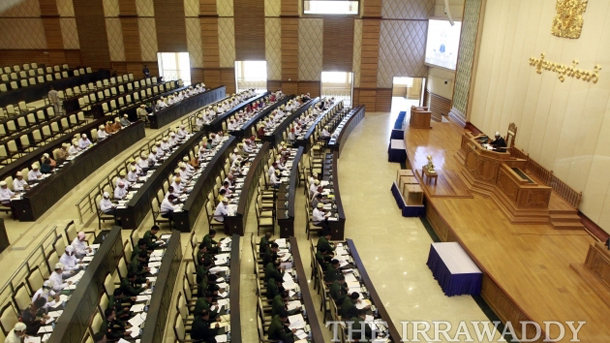RANGOON — Burma’s Union Parliament decided on Thursday to double down on its endorsement of six-party talks on constitutional reform, and agreed to re-examine a controversial National Education Law passed last year, with lawmakers asking the Ministry of Education to draft amendments for consideration.
In a formal message to President Thein Sein, Parliament again called for the first round of six-party talks “as soon as possible” in order to develop a framework and procedural particulars for the dialogue, according to a press release from the legislature.
The missive comes days after the president on Monday sent a letter to Parliament saying the six-party proposal lacked sufficient detail and a precise framework for how constitutional issues would be discussed. Thein Sein also suggested that a six-party dialogue would represent too narrow a cross-section of Burmese society for meaningful discussion.
The six-party proposal was first put forward in November by a lawmaker from the ruling Union Solidarity and Development Party (USDP), who urged a meeting between Thein Sein, Burma Army commander in chief Snr-Gen Min Aung Hlaing, the speakers of the Upper and Lower Houses of Parliament, National League for Democracy (NLD) chairwoman Aung San Suu Kyi and a voice from one of Burma’s ethnic minority parties to discuss constitutional reforms.
Political commentator Yan Myo Thein told The Irrawaddy on Friday that the president should swiftly act on the formal message from lawmakers, in accordance to the 2008 Constitution, wherein Article 203 states that the president is accountable to the Union Parliament.
“According to the Constitution, the president is accountable to the Union Parliament. The Union Parliament elected the president so he is responsible for carrying out proposals that are approved without objection in Parliament.”
Upper House Speaker Khin Aung Myint asked members of Parliament on Wednesday to submit suggestions on matters of priority to be discussed during the six-party dialogue.
Wading into a second contentious issue, Parliament agreed to consider amending the National Education Law, which was passed in July amid an outcry from students and education groups who complained that a failure to decentralize the education system and a lack of input from relevant stakeholders were among the lawmaking process’s flaws.
Parliament’s press release instructed the Ministry of Education to draw up a draft bill of amendments to the National Education Law, and pledged once the proposed changes are drafted to “urgently” begin deliberations that would include “Each [House of] Parliament, related committees, commissions, departments, and relevant people from organizations and professionals.”
“The problems emerged because the government didn’t do adequate consultation with students and professionals. Now Parliament and the government are passing the buck to each other and this is not a way to solve those problems,” said Thu Thu Mar, a member of the National Network for Education Reform (NNER).
Prior to the bill’s passage, the NNER held numerous discussions on education nationwide, and the network has complained that its input was ignored in the final legislation.
Passage of the law prompted student and teacher demonstrations in Burma’s largest cities, and a 15-member coalition calling itself the Action Committee for Democratic Education (ACDE) was formed to push for changes to the legislation.
Demonstrations were suspended in November, after student leaders issued an ultimatum demanding that the law be amended to reflect the will of students and educators within 60 days. That deadline passed without action from Parliament or the president, and protests resumed on Tuesday to demand a response from lawmakers.
This week protesting students also began a 400-mile march from Mandalay to Rangoon and requested that discussions be held that would include four parties—the student-led ACDE, education advocates, lawmakers and relevant officials from the Thein Sein administration—before any amendments are made to the legislation.

















